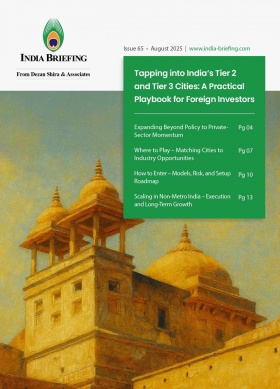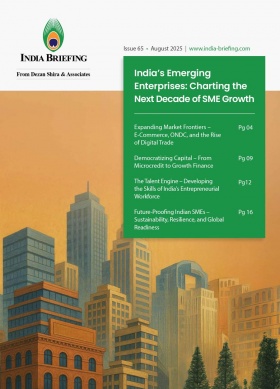India-UK Social Security Agreement: A Breakthrough for Indian Professionals and Employers
The India-UK social security agreement, called the Double Contribution Convention under the India-UK Comprehensive and Economic Trade Agreement (CETA), benefits employers and cross-border talents alike through payroll efficiencies and eliminating dual social security payments.
India and the United Kingdom have taken major steps to strengthen their economic and trade partnership, as well as to facilitate the movement of talent and labor between the two countries.
What is the India-UK Double Contribution Convention (DCC)?
On May 6, 2025, India and the UK announced the India-UK Comprehensive and Economic Trade Agreement (CETA) in London, along with conclusion of negotiations on Double Contribution Convention (DCC).
The DCC is a form of social security agreement (SSA) designed to prevent the duplication of social security contributions for employees and employers when professionals are temporarily posted abroad. Typically, workers and their employers must contribute to the host country’s social security system, even if they continue to pay into their home system. This often leads to double payments and fragmented contribution records.
The India-UK DCC aims to prevent dual social security contributions for short-term employees and their employers. The arrangement is expected to benefit nearly 75,000 Indian professionals undertaking temporary assignments in the UK and about 900 British employers engaging Indian workers. The same relief will apply reciprocally to British nationals working temporarily in India.
As India and the UK deepen their trade and investment linkages through the CETA, the DCC stands out as a practical, business-enabling measure that aligns with India’s vision of expanding its global workforce footprint while safeguarding employee benefits.
Who qualifies as a detached worker?
A detached worker is an employee temporarily assigned by their home-country employer to work in another country under a bilateral SSA. In this arrangement, the workers continue contributing to their home country’s social security system and are exempt from paying contributions in the host country for the specified duration.
Under the proposed India-UK DCC, such detached workers will be able to work temporarily in either country, typically for up to three years, without making dual social security payments, thereby preserving their contribution records and avoiding financial duplication.
UK work visa categories
For professionals seeking employment in the UK, several types of work visas facilitate entry and residence based on skill level, job role, or employer sponsorship. These include:
- Skilled worker visa – for individuals with a job offer from a UK-licensed employer.
- Scale-up visa – designed for employees joining rapidly growing UK companies.
- Temporary worker visa – for short-term or seasonal employment.
- Global business mobility visa – for employees of multinational companies on intra-company transfers.
- High potential individual visa – for graduates from top global universities.
- Graduate visa – for international students wishing to remain in the UK to work after completing their studies.
- Global talent visa – for leaders or potential leaders in fields like science, engineering, technology, and the arts.
- UK ancestry visa – available to commonwealth citizens with a UK-born grandparent, allowing them to live and work in the UK.
How the DCC will work between India and the UK
Ordinarily, social security contributions are paid in the country where employment is performed. However, under the DCC, an employee sent by an India-based company to work in the UK for a short-term project of up to three years will continue contributing to India’s Employees’ Provident Fund (EPF) instead of paying UK National Insurance Contributions (NICs). The same arrangement applies to UK employees temporarily assigned to India, who will continue contributing to their home system.
If a worker’s stay exceeds 36 months, they will no longer be considered a detached worker and must begin contributing to the host country’s social security program. Importantly, this agreement covers contributions only; it does not extend to benefits such as pensions or healthcare entitlements.
The DCC does not alter visa or immigration rules. Indian professionals working in the UK will still need to meet existing immigration criteria, including sponsorships, salary thresholds (for example, at least £52,500 per year under the Senior or Specialist Worker Visa), and applicable visa and health surcharges. These safeguards ensure that the agreement does not undercut domestic labor markets or influence migration patterns.
Benefits for Indian professionals and employers
By preventing double social security payments and preserving workers’ contribution records, the DCC can strengthen ease of doing business for companies operating across India and the UK. It promotes workforce mobility, supports service trade expansion, and contributes to a more balanced and growth-oriented relationship under India-UK economic cooperation.
Economic and strategic impact of the India-UK DCC
The DCC is expected to boost bilateral trade and labor mobility by reducing costs for companies and ensuring smoother deployment of talent between the two countries. For Indian professionals, it prevents income loss through redundant contributions and enhances their cost competitiveness in the UK labor market. For employers, it lowers hiring costs and simplifies compliance.
As per the UK government estimates, the broader CETA framework, including the DCC, could contribute approximately £4.8 billion annually to the country’s GDP, increase wages by £2.2 billion, and generate an additional £1.8 billion in public receipts in the long term.
For Indian companies, especially in IT, consulting, engineering, and professional services, the DCC substantially improves cost competitiveness and talent mobility. By removing the obligation to contribute to both Indian and UK social security systems, employers can significantly reduce payroll expenses and improve employee take-home pay.
According to official statements, this measure aligns with India’s long-term efforts to secure reciprocal social security protection for its global workforce. It also addresses a persistent concern of Indian industry, particularly in sectors with a high volume of short-term overseas postings.
Background and economic context
The DCC complements India’s growing economic footprint in the UK. According to the Grant Thornton UK India Tracker 2025, the number of Indian-owned companies operating in the UK rose by 23 percent, from 971 in 2024 to 1,197 in 2025, employing over 126,720 people and generating a combined revenue of £72.14 billion.
|
Top Indian Employers in the UK |
||
|
UK company |
Global ultimate owner |
Latest employee numbers (as of 2025) |
|
Jaguar Land Rover Automotive Plc |
Tata Motors Limited |
41,930 |
|
Tata Steel Europe Limited |
Tata Steel Limited |
20,600 |
|
Firstsource Solutions UK Limited |
RPSG Ventures Limited |
4,502 |
|
Airtel Africa Plc |
Bharti Airtel Limited |
4,806 |
|
TVS Logistics Investment UK Limited |
TVS Supply Chain Solutions Limited |
2,973 |
|
HCL Technologies UK Limited |
HCL Technologies Limited |
2,844 |
|
Tenon FM Limited |
Tenon Facility Management India |
1,752 |
|
The Barnagore Jute Factory Plc |
Namokar Vinimoy Pvt Limited |
1,693 |
|
GH Holdings 1 Limited |
Bharti Overseas Private Limited |
1,562 |
|
Hinduja Global Solutions UK Limited |
Hinduja Global Solutions |
1,385 |
|
The Capital Markets Company (UK) Limited |
Wipro Limited |
1,383 |
|
Norlake Hospitality Limited |
Bharti Overseas Private Limited |
1,169 |
|
Cyient Europe Limited |
Cyient Limited |
1,053 |
|
Essar Oil (UK) Limited |
Essar Energy Transition Holdings |
1,041 |
Source: India meets Britain Tracker 2025
For these businesses, the agreement provides a timely boost by improving financial predictability and operational efficiency in managing short-term assignments.
India currently maintains SSA with 20 other countries. This includes Portugal, Quebec, Brazil, Australia, Japan and EU member countries such as Belgium, Germany, Switzerland, Luxemburg, etc.
UK companies expanding operations in India
The latest phase of the India-UK trade partnership has seen a surge in British corporate activity across India’s high-growth sectors. As part of new business deals and investment commitments linked to the CETA, 26 UK companies have secured new contracts and expansion opportunities in India, reinforcing bilateral economic cooperation.
As per a report published July 24, 2025, major UK firms such as Airbus and Rolls-Royce are set to deliver aircraft worth around £5 billion to leading Indian airlines, with more than half powered by Rolls-Royce engines. The International Aerospace Manufacturing Private Limited (IAMPL), a joint venture between Rolls-Royce and Hindustan Aeronautics Limited (HAL), is expanding its Hosur, Tamil Nadu, facility with an additional £30 million investment.
Similarly, other leading ventures include Croda’s £50 million investment in Gujarat’s Dahej industrial hub, Wilson Power Solutions’ £21 million project in Chennai to expand transformer manufacturing, and MergeXR Studio’s £34 million worth of contracts with Indian media firms. UK-based Thor Specialities, Buro Happold, Virtual Autopsy UK, and Lakeland Dairies Foodservice have also announced major investments and export partnerships spanning healthcare, engineering, and consumer goods.
These developments highlight the UK’s growing presence in India’s aerospace, technology, manufacturing, and services sectors, contributing to job creation under the expanding India–UK economic and bilateral relations.
Integration with the India-UK CETA 2025: Facilitating mobility and services trade
The CETA framework between India and the UK includes extensive provisions on trade in services, mobility, and professional qualifications. The DCC forms a critical pillar within this framework by easing the movement of natural persons such as intra-corporate transferees, contractual service suppliers, and independent professionals.
The UK has extended broader market access commitments across 137 sub-sectors, covering IT/ITeS, professional services, education, and healthcare, while India has reciprocated in 108 sub-sectors. Both countries have agreed to remove caps and economic needs tests for temporary movement, creating a more predictable business environment.
The DCC, therefore, enhances the practical mobility of professionals, ensuring that the movement of skilled talent under the CETA framework is not hindered by redundant social security costs.
Outlook: Building a stronger India-UK economic relationship
The DCC is expected to further strengthen India’s services exports, especially in high-skill domains such as technology and consulting, where Indian professionals form a significant part of the UK’s short-term workforce.
Decoupling social security obligations from immigration processes will also encourage more structured global workforce planning by Indian multinationals.
According to industry estimates, the DCC could save Indian employers millions of pounds annually, improve India’s talent competitiveness, and encourage more collaborative ventures between businesses in both countries.
About Us
India Briefing is one of five regional publications under the Asia Briefing brand. It is supported by Dezan Shira & Associates, a pan-Asia, multi-disciplinary professional services firm that assists foreign investors throughout Asia, including through offices in Delhi, Mumbai, and Bengaluru in India. Dezan Shira & Associates also maintains offices or has alliance partners assisting foreign investors in China, Hong Kong SAR, Vietnam, Indonesia, Singapore, Malaysia, Mongolia, Dubai (UAE), Japan, South Korea, Nepal, The Philippines, Sri Lanka, Thailand, Italy, Germany, Bangladesh, Australia, United States, and United Kingdom and Ireland.
For a complimentary subscription to India Briefing’s content products, please click here. For support with establishing a business in India or for assistance in analyzing and entering markets, please contact the firm at india@dezshira.com or visit our website at www.dezshira.com.
- Previous Article GST 2.0: How India’s New HSN and SAC Code Structure Transforms Tax Compliance for Businesses
- Next Article Transshipment and Due Diligence in India’s Trade Compliance Landscape












